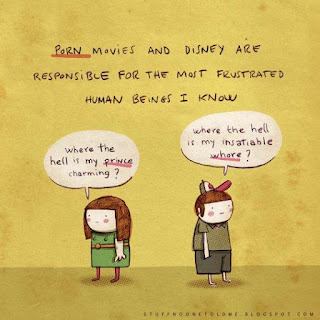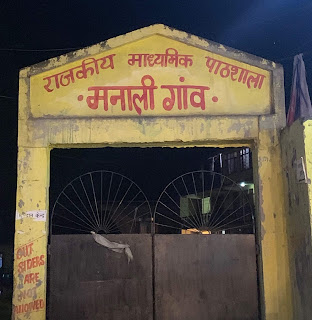It's not disney, it is instagram!
Update: Instagram has disabled viewers for stories post 24 hours now, even if they are saved as highlights. I think this is a good step on Instagram's part to limit the kind of insights they give us. Giving us insights into who is watching our story is fine, but the ranking system they had in place for the viewers of a story based on profile visits and interactions, was just not required.
I don't know how many of you have seen that meme or read this quote somewhere, "Disney is what is wrong with the world". Those Disney fairytales and movies paint a picture which is far from truth and people spend their lives living with such notions. Little girls grow up watching these movies, where the princesses are always pretty and thin and petite and that is the entire depth of their character. Then comes along our handsome prince charming who overcomes an obstacle, a monster or the evil stepsisters, eventually rescuing our princess and then they sail off into the sunset for their happily ever after!
So many things wrong with these two lines. But that is not what I am trying to explain today. Today I want to talk about how Instagram, the world's most popular social media platform is messing with all of us.
On the 9th of February, 2009, Facebook rolled out a new feature, the like button. On this day Mark Zuckerberg inflicted the concept of virtual likes on this world and it was like someone opened the modern day Pandora's box. It was one of those moments that change everything. It changed the way generations to come would perceive other and more importantly themselves. It was like giving the world a metric to assess self-worth! It seemed so simple, you like something and you can click a button to show it. What he inadvertently did, is quantify and amplify the concept of external validation. Because of the reach of the internet and the advent of social media, it became a phenomenon. People with a greater number of likes were the cool ones and if you were at the end of the spectrum, oh well you sit at the losers table. It somehow reinforced the high school mentality (mean girls?) and gave it way to persist beyond our teen years. We all got in the race for getting more likes and subsequent acceptance from our peers.
Ofcourse this concept of likes was twisted and turned and used in different forms on different social media platforms, but the basic concept remained the same. Another feature, if you guys know about it is the rewards snapchat. Not actually rewards but those little icons that come next to the name of your friends. The idea is that based on the interaction between two people it would rate them as friends, good friends or best friends with yellow and red hearts and what not. Wow, what a great way to measure friendship.
(which is roughly 1/7th of the world's population being regularly active on this platform, which gives it immense power to influence generations at a time!)
Now that was general social media bashing. Let's get down to specific Instagram bashing. Have you heard of this concept of FOMO. If you haven't heard of this, congratulations you are officially passe. I mean if social media was hell, then Instagram would be Crowley (go watch supernatural). So about a decade ago, Facebook was the new thing in town and everyone just had to have an account. We all made up fake birthdays (cause of the age limit) and signed on to this new thing! Okay wait, it was Orkut first, but Facebook was the first big thing. But as teenagers, Facebook was not as big an influence in my life as Instagram is for today's teenagers. Given that social media was in its nascent stages and now it has percolated extremely deeply into our society and lives, that is also a factor. But we have to look at what Instagram propagates. The sole purpose of this platform is to glorify the aesthetic appeal of things, of how everything looks. We have moved on to a life of filters. Instagram plays a big role in distorting reality.
The problem with Instagram is its extreme focus on visual stimuli. Photos and videos, what looks good! It is solely focused on how something or someone looks. I know a picture can say a thousand words, but if all we do is look at pictures, the words tend to get lost.
I don't know the exact working of the instagram algorithm, but something basic that I can make out is that, if a photo is well liked, it comes at the top of your feed, rather than being chronological. And this spins out in the favor of that account. You see that photo at the top of your feed, you see so many people have liked it, you might go to their profile, so more photos get liked and after a certain point, everyone starts liking their photos because of course, if the majority think its nice, it has to be nice. This also creates a feeling of inadequacy within ourselves. We assume other people's curated moments to be their life and then start feeling bad about our life. And it doesn't even help the popular people, it gives them a sense of an inflated ego and they expect to be treated the same way in real life as they are on social media.
All of these implications make Instagram out to be a much harmful and dangerous platform than its competitors. There have been many surveys and studies conducted where it has come out to be most stressful and harmful of all social media. It's not that it was intended that way, or the other platforms do not have a negative effect at all, but you do not need to be so vigilant on other platforms as compared to instagram.
I don't know how many of you have seen that meme or read this quote somewhere, "Disney is what is wrong with the world". Those Disney fairytales and movies paint a picture which is far from truth and people spend their lives living with such notions. Little girls grow up watching these movies, where the princesses are always pretty and thin and petite and that is the entire depth of their character. Then comes along our handsome prince charming who overcomes an obstacle, a monster or the evil stepsisters, eventually rescuing our princess and then they sail off into the sunset for their happily ever after!
So many things wrong with these two lines. But that is not what I am trying to explain today. Today I want to talk about how Instagram, the world's most popular social media platform is messing with all of us.
On the 9th of February, 2009, Facebook rolled out a new feature, the like button. On this day Mark Zuckerberg inflicted the concept of virtual likes on this world and it was like someone opened the modern day Pandora's box. It was one of those moments that change everything. It changed the way generations to come would perceive other and more importantly themselves. It was like giving the world a metric to assess self-worth! It seemed so simple, you like something and you can click a button to show it. What he inadvertently did, is quantify and amplify the concept of external validation. Because of the reach of the internet and the advent of social media, it became a phenomenon. People with a greater number of likes were the cool ones and if you were at the end of the spectrum, oh well you sit at the losers table. It somehow reinforced the high school mentality (mean girls?) and gave it way to persist beyond our teen years. We all got in the race for getting more likes and subsequent acceptance from our peers.
Ofcourse this concept of likes was twisted and turned and used in different forms on different social media platforms, but the basic concept remained the same. Another feature, if you guys know about it is the rewards snapchat. Not actually rewards but those little icons that come next to the name of your friends. The idea is that based on the interaction between two people it would rate them as friends, good friends or best friends with yellow and red hearts and what not. Wow, what a great way to measure friendship.
As of June this year, Instagram crossed the 1 Bn active users mark!
(which is roughly 1/7th of the world's population being regularly active on this platform, which gives it immense power to influence generations at a time!)
Now that was general social media bashing. Let's get down to specific Instagram bashing. Have you heard of this concept of FOMO. If you haven't heard of this, congratulations you are officially passe. I mean if social media was hell, then Instagram would be Crowley (go watch supernatural). So about a decade ago, Facebook was the new thing in town and everyone just had to have an account. We all made up fake birthdays (cause of the age limit) and signed on to this new thing! Okay wait, it was Orkut first, but Facebook was the first big thing. But as teenagers, Facebook was not as big an influence in my life as Instagram is for today's teenagers. Given that social media was in its nascent stages and now it has percolated extremely deeply into our society and lives, that is also a factor. But we have to look at what Instagram propagates. The sole purpose of this platform is to glorify the aesthetic appeal of things, of how everything looks. We have moved on to a life of filters. Instagram plays a big role in distorting reality.
The problem with Instagram is its extreme focus on visual stimuli. Photos and videos, what looks good! It is solely focused on how something or someone looks. I know a picture can say a thousand words, but if all we do is look at pictures, the words tend to get lost.
I don't know the exact working of the instagram algorithm, but something basic that I can make out is that, if a photo is well liked, it comes at the top of your feed, rather than being chronological. And this spins out in the favor of that account. You see that photo at the top of your feed, you see so many people have liked it, you might go to their profile, so more photos get liked and after a certain point, everyone starts liking their photos because of course, if the majority think its nice, it has to be nice. This also creates a feeling of inadequacy within ourselves. We assume other people's curated moments to be their life and then start feeling bad about our life. And it doesn't even help the popular people, it gives them a sense of an inflated ego and they expect to be treated the same way in real life as they are on social media.
All of these implications make Instagram out to be a much harmful and dangerous platform than its competitors. There have been many surveys and studies conducted where it has come out to be most stressful and harmful of all social media. It's not that it was intended that way, or the other platforms do not have a negative effect at all, but you do not need to be so vigilant on other platforms as compared to instagram.






.png)


Comments
Post a Comment